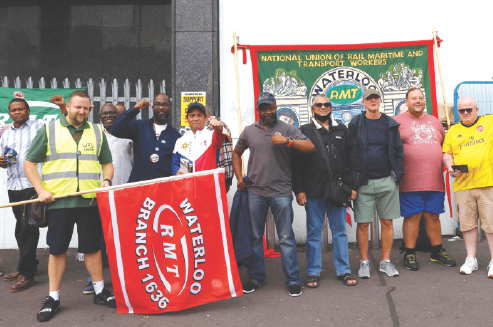Strikes bring British trains to a standstill


Employers and unions criticize each other in dispute over pay, conditions
Commuters, holidaymakers and other travelers hoping to use the United Kingdom's rail network had a difficult day on Thursday as the latest in a series of strikes brought trains to a standstill.
The industrial action, part of a long-running dispute between workers seeking better pay and conditions and train companies seeking efficiency, becalmed about 80 percent of the network.
Unions representing 45,000 rail workers will hold another strike on Saturday.
Unions, train operators and the government have all urged people not to travel because buses, taxis and roads will be busier because of the strikes. The industrial action involved the National Union of Rail, Maritime and Transport Workers, or RMT, and several other unions.
Mick Lynch, the RMT's general secretary, said members want a pay rise that keeps up with inflation, and reassurances that their pensions will not be watered down.
But he said Transport Secretary Grant Shapps has stood in the way of an agreement.
"He's blocking a deal," he told Times Radio, alleging that Shapps is playing hardball to impress the two candidates seeking to replace Prime Minister Boris Johnson. "He needs to get out of the way or change his stance."
Lynch told ITV's Good Morning Britain that the RMT and main employer Network Rail have moved closer in negotiations, but that "the gap is still there".
"We've got to find a way to bridge that, but I fear that because of the political interference that's happening … we're not able to do that."
However, The Independent newspaper quoted Steve Montgomery, chairman of the Rail Delivery Group representing train companies as saying: "With passenger revenue still 20 percent below 2019 levels, securing a strong future means we have to change and move with the times."
But Shapps insisted he has not blocked a deal, but that unions are "hell-bent on causing as much misery as possible to the very same taxpayers who stumped up 600 pounds ($723) per household to ensure not a single rail worker lost their job during the pandemic".
Andrew Haines, chief executive of Network Rail, said on BBC Radio 4's Today that negotiations have been slow and that the unions have not made clear "what it would take for this strike to be called off".
"We're desperate to bring this to a resolution in a way that is affordable for the country," he said.
Additionally, separate strikes were set for train services in London on Friday, and for some bus services in the capital.
Lynch told Sky News that other unions are increasingly backing the RMT in its dispute.
"What you are going to get is a wave of solidarity action, generalized strike action, synchronized action," he said.

































